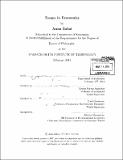| dc.contributor.advisor | George-Marios Angeletos and Guido Lorenzoni. | en_US |
| dc.contributor.author | Zabai, Anna | en_US |
| dc.contributor.other | Massachusetts Institute of Technology. Department of Economics. | en_US |
| dc.date.accessioned | 2014-05-23T19:42:06Z | |
| dc.date.available | 2014-05-23T19:42:06Z | |
| dc.date.issued | 2014 | en_US |
| dc.identifier.uri | http://hdl.handle.net/1721.1/87529 | |
| dc.description | Thesis: Ph. D., Massachusetts Institute of Technology, Department of Economics, 2014. | en_US |
| dc.description | "February 2014." Cataloged from PDF version of thesis. | en_US |
| dc.description | Includes bibliographical references. | en_US |
| dc.description.abstract | In the first chapter, I explore the role of coordination problems and self-fulfilling beliefs as drivers of sovereign default risk. I employ global-game techniques to induce a unique equilibrium. Along the unique equilibrium, I show how the equilibrium default risk can be decomposed in a solvency-risk component and a coordination-risk component. I then study how fiscal policy can be effective in managing the risk of coordination and I characterise how the shape of the optimal policy is affected by the presence of this risk. I finally show that making the deficit contingent on interest rate movements is more effective in managing default risk than using non-contingent fiscal targets. The second chapter (co-authored with Emine Boz) studies a model in which a government issues bonds to fund a project whose return is unknown to private investors. The government has access to a technology that allows it to manipulate the mean of a public signal. Even though investors fully internalize the manipulation technology - which makes it hard for the government to "fool" them - and manipulation is costly, we show that it occurs in equilibrium. Our extensions reveal that higher transparency leads to weaker manipulation incentives, news about a high probability of manipulation significantly lowers the bond price, and that manipulating private signals leads to similar outcomes as manipulating public signals. The third chapter investigates the relationship between trust and firm activity. Using Italian micro-data, I find that trust affects labour productivity, although larger firms do not appear to benefit more from higher levels of trust. This is in contrast with evidence from cross-country studies, and suggests the cross-country correlation may be spurious. I do not find that trust matters to the main capital owner's decision to delegate control of the firm to either relatives or professional managers, nor that it makes a difference to the firm's choice of hiring accountants and auditors. | en_US |
| dc.description.statementofresponsibility | by Anna Zabai. | en_US |
| dc.format.extent | 154 pages | en_US |
| dc.language.iso | eng | en_US |
| dc.publisher | Massachusetts Institute of Technology | en_US |
| dc.rights | M.I.T. theses are protected by copyright. They may be viewed from this source for any purpose, but reproduction or distribution in any format is prohibited without written permission. See provided URL for inquiries about permission. | en_US |
| dc.rights.uri | http://dspace.mit.edu/handle/1721.1/7582 | en_US |
| dc.subject | Economics. | en_US |
| dc.title | Essays in economics | en_US |
| dc.type | Thesis | en_US |
| dc.description.degree | Ph. D. | en_US |
| dc.contributor.department | Massachusetts Institute of Technology. Department of Economics | |
| dc.identifier.oclc | 879679443 | en_US |
